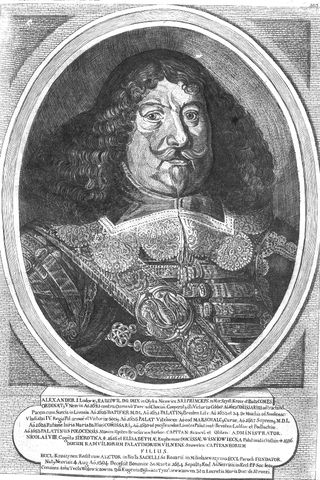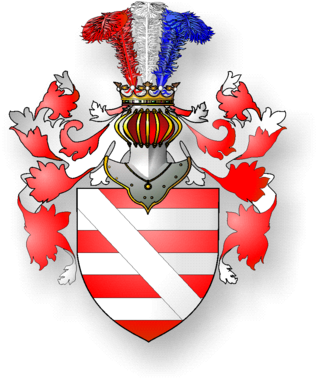
Marie Casimire Louise de La Grange d'Arquien, known also by the diminutive form "Marysieńka" was a French noblewoman who became the queen consort of Poland and grand duchess consort of Lithuania from 1674 to 1696 by her marriage to King and Grand Duke John III Sobieski of the Polish–Lithuanian Commonwealth. She had great influence upon the affairs of state with the aproval of her spouse, and acted in effect as regent during his absence.
Sobieski is a Polish noble family name, and may refer to:

Brest Litovsk Voivodeship was a unit of administrative territorial division and a seat of local government (voivode) within the Grand Duchy of Lithuania since 1566 until the May Constitution in 1791, and from 1791 to 1795 as a voivodeship in Poland. It was constituted from Brest-Litovsk and Pinsk counties.

Prince Michał Serwacy Wiśniowiecki was a Lithuanian nobleman, magnate, politician, diplomat, general, a successful military commander and the last male representative of the Wiśniowiecki family.

Prince Aleksander Ludwik Radziwiłł was a Polish–Lithuanian nobleman.
Katarzyna Eugenia Skumin Tyszkiewicz was a Polish noblewoman.

The House of Tyszkiewicz was a wealthy and influential Polish-Lithuanian magnate family of Ruthenian origin, with roots traced to the times of the Grand Duchy of Lithuania. They held the Polish coat of arms Leliwa. Their nobility was reaffirmed in Polish–Lithuanian Commonwealth and the Russian Empire.

The House of Pac or Pacowie was one of the most influential noble families in the Grand Duchy of Lithuania during the era of the Polish–Lithuanian Commonwealth. Numerous high-ranking officials of the Commonwealth came from their ranks. Their coat of arms was Gozdawa.

Samuel Ludwik Zasadius or Zasadyus, Sassadius was a Polish religious writer, pastor and author of popular sermons and prayer-books. He was also known for propagating Polishness in Cieszyn Silesia.

Michael Rohoza was the Metropolitan of Kiev, Galicia and all Rus' in the Patriarchate of Constantinople of the Eastern Orthodox Church from 1588 to 1596. In 1595, he signed the Union of Brest which moved the metropolis from the jurisdiction of the Patriarchate of Constantinople to the jurisdiction of the Holy See. By this act, the Ruthenian Uniate Church was formed in the territory of the Polish–Lithuanian Commonwealth. From 1596 until his death in 1599, he held the title of "Metropolitan of Kiev, Galicia and all Ruthenia" in the Ruthenian Uniate Church.

Hypatius Pociej, Polish: Hipacy Pociej, Ukrainian: Іпатій Потій) was the "Metropolitan of Kiev, Galicia and all Ruthenia" in the Ruthenian Uniate Church — a sui juris Eastern Catholic Church in full communion with the Holy See. He reigned from 1599 to his death in 1613. He played an active role in the 1595 Union of Brest of which he was a firm supporter. He was also a writer, polemist and theologian.

Konstanty Ludwik Plater, was Castellan of Troki from 1770, voivode of Mstislavl from 1758 to 1770, Castellan of Polotsk from 1754 to 1758, the great Lithuanian Magnus Scriptor from 1746 to 1754, Maréchal of the Lithuanian Tribunal in 1754, and Starosta of Livonia and Dyneburg. In 1754, he was awarded with the Order of White Eagle, Knight of the Order of Saint Stanislaus, and the Russian Order of St. Alexander Nevsky. Married to Countess Augustina Oginska on 16 Aug 1744.
The Battle of Vilnius was a battle which took place on 16 April 1702 in Vilnius, the capital of the Grand Duchy of Lithuania, during the Great Northern War.
The Ukrainian Catholic Eparchy of Volodymyr–Brest was a suffragan eparchy of the Metropolis of Kiev, Galicia and all Ruthenia in the Ruthenian Uniate Church. It was situated in the Polish–Lithuanian Commonwealth in parts of the modern states of Ukraine and Belarus under Imperial Russian rule, from 1569 until 1833.
Królewicz was the title given to the sons and daughters of the king of Poland, later the Polish–Lithuanian Commonwealth. It was similar in its distinctiveness to the Spanish and Portuguese title of infante, also reserved to the children of the monarch. Though, it was used only to denote one's status as a King's child. Królewicz and królewna has no direct equivalent in other languages and was translated to the English prince and German prinz, like dynasts of a royal house. Królewicze since the 16th century could not also be regarded as and equivalent to the princes of the blood, because the Polish monarchy was not hereditary since 1573, when after the death of the last Jagiellon king, future Henry III of France was elected. In official Latin titulature children of Polish kings were often styled as Poloniae princeps or princeps Poloniae, meaning Prince/ss of Poland or Polish prince/ss. In more official way, the full style of sons of monarchs was Dei Gratia regius princeps Poloniae et Lithuaniae for the sons.
Ludwik Regamey (1877-1967) was a Polish construction engineer by trade. He worked in Bydgoszcz where he had a very active associative life as a musician. He was the first chairman of the Alliance Française in Bydgoszcz. After moving to France in 1934, he was a formidable promoter of French and Polish culture exchanges till his demise in 1977, in Toulouse.
Pociej is a surname. Notable people with this surname include:

The Plater family is a noble family originating from Westphalia, whose members settled in Livonia and later in Lithuania and Poland. Their original seat was Broel in County of Mark, hence the family's nickname was von dem Broel. The part of the family that moved in 15th century to Livonia used the name Plater or the combined surname Broel-Plater. The Plater-Zyberk branch line was founded by Michał Plater-Zyberk, who married Izabela Helena Syberg zu Wischling, daughter of Jan Tadeusz Syberg zu Wischling, the last male representative of the Syberg family. In order to save his wife's family name, he adopted her surname and coat of arms.











